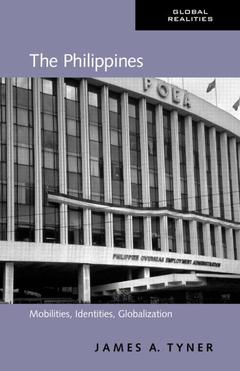Description
The Philippines
Mobilities, Identities, Globalization
Global Realities Series
Language: English
Subjects for The Philippines:
Keywords
Overseas Employment; Ph Ili; overseas; Private Recruitment Agencies; employment; Ili Pp; private; International Labor Migration; recruitment; Philippine State; agencies; Overseas Employment Program; administration; Philippine Diaspora; international; Filipino Workers; labor; OFWs; migration; Recruitment Agencies; filipino; POEA; Metro Manila; Filipino OCWs; Medium Term Philippine Development Plan; Global City Formation; Pe Rf; Lo Ba; World’s Door; OCWs; Global Cities; Pasig River; Filipino Community; Filipina Nurse; DFA
Publication date: 11-2008
· 12.9x19.8 cm · Paperback
Publication date: 11-2008
· 12.9x19.8 cm · Hardback
Description
/li>Contents
/li>Readership
/li>Biography
/li>
Nearly five million migrant workers from the Philippines are employed in over 190 countries and territories. They work as doctors and domestic helpers, engineers and entertainers, seamstresses and surveyors. It is through their collective labor that the Philippines has assumed a global presence.
For over five centuries the Philippines has been integrated into the world economy. Only recently, however, has the Philippines been a pro-active agent in the production of a global economy. Since the 1970s the Philippine state, in connection with myriad private institutions, has recruited, trained, marketed, and deployed a mobile work-force. Annually, approximately one million migrant workers travel to all corners of the world. The Philippines seeks to understand how the Philippines has become the world?s largest exporter of government-sponsored temporary contract labor and, in the process, has dramatically reshaped both the processes of globalization and also our understanding of globalization as concept.
1. Local Contexts, Distant Horizons 2. Manufacturing a Global Presence 3. Manila's Place in the World 4. Global-Philippines.Com 5. Performing Globalization 6. Beyond the Philippines
James A. Tyner (Ph.D., University of Southern California) is Professor of Geography at Kent State University. His research interests include population geography, political geography, and Southeast Asia. He is the author of nine books, including Made in the Philippines: Gendered Discourses and the Making of Migrants (Routledge).




